Posts Tagged ‘Correctional Service of Canada’
Posted on: November 23rd, 2016 by Waterloo Region Crime Prevention Council
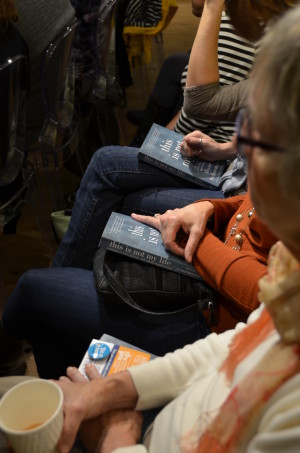 All of the calls to action already mentioned in the previous blog posts (humanizing people in prison & advocating for programs that work) help to create and strengthen system change in big and small ways. The work of larger structural change is long term, often slow work: Not for the faint of heart, but everyone can still play a role.
All of the calls to action already mentioned in the previous blog posts (humanizing people in prison & advocating for programs that work) help to create and strengthen system change in big and small ways. The work of larger structural change is long term, often slow work: Not for the faint of heart, but everyone can still play a role.
Here are a few ways you or your friends can contribute toward society and system changes.
- Male Allies Against Sexual Violence – Through public education, the Male Allies program invites men and boys to be leaders in the work of ending gender-based violence. Their goal is to encourage critical introspection in men and boys, which begins by helping them to understand gender-based violence as a men’s issue. Over the past eight years, they have offered hundreds of workshops to thousands of men and boys and have just started a ground-breaking training initiative with the Ontario Hockey League.
- Learn more about the root causes of crime. In order to prevent something, it’s important to understand the contributing factors. As a community, we have the responsibility to address these conditions which hinder healthy development and can lead to criminal behaviour.
- Learn more about Smart on Crime approaches to addressing crime. Everyone has heard about tough on crime, but what about Smart on Crime? As a community, we can use language that shows we can build a community that is safe and vibrant for all people living in Waterloo Region.
- Follow the advocacy work of Howard Sapers – Until recently, Howard Sapers was the Correctional Investigator of Canada responsible for the investigation of individual and systemic concerns. He was also a guest for a 2015 Friends of Crime Prevention event. On November 8, the Ontario Government appointed Mr. Sapers to be an independent advisor on corrections reform and to provide advice to the government on the use of segregation and ways to improve the province’s adult corrections system.
When we have people and community organizations working at all three areas of action to humanize people in prison and reduce stigma for loved ones, advocate for programs that work and enter into deeper levels of system and societal change, we can move the needle on progressive change.
If you decide to take some action, we would love to hear about it – 6 weeks from now, or 6 months from now! Get in touch with Juanita Metzger to share your story.
Posted on: November 23rd, 2016 by Waterloo Region Crime Prevention Council
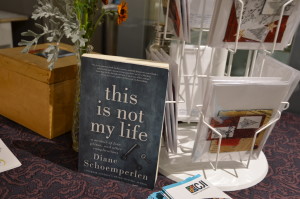 Inevitably, the Turn the Page book club discussions turned to the support provided to people in prison while they serve their sentences and the programs and support available during parole or upon release. Many people in attendance admitted to not knowing the reality facing people on the ‘inside’.
Inevitably, the Turn the Page book club discussions turned to the support provided to people in prison while they serve their sentences and the programs and support available during parole or upon release. Many people in attendance admitted to not knowing the reality facing people on the ‘inside’.
The past 5-7 years have seen a cut in federal funding to several prison support programs (inside and outside prisons) that have shown to be effective in reducing recidivism, building skills for reintegration and providing support to some of the most stigmatized prisoners, people who have sexually offended.
You might be interested in supporting these programs with a donation to keep them going. Or, as someone suggested at the book club event, you might want to write a letter to your Member of Parliament advocating for increased funding to support these valuable programs.
- Lifeline provides support and transitional housing to men who have served a life sentence as they prepare for reintegration into our communities. Funding for this program was cut in 2012/2013. Some Lifeline programs are still offered through various St. Leonard Society organizations.
- Circles of Support and Accountability is a Canadian-made restorative justice program for men and women who have committed serious sexual offences. CoSA allows the community to play a direct role in the restoration, reintegration, and risk management of people who are often seen with only fear and anger. COSA experienced the same severe federal funding cuts as Lifeline in 2014 and has spent a great deal of time figuring out how to support a nation-wide program of COSA chapters. They have even some sample letters already prepared which you could use to advocate for reinstated funding for COSA.
- Prison farms have been a part of 6 federal prison institutions since the establishment of correctional facilities in Canada. They were defunded and closed by the federal government between 2009 – 2013. Prison farms provided beneficial employability and training opportunities, time management and responsibility skills, animal therapy, productive labour and physical exercise, access to nature, individual and team building work, and training in farm management and operation. There are many advocating for the return of prison farms as a prosocial training opportunity for inmates. Project Soil published an excellent case study of the prison farms at Frontenac and Pittsburgh Institutions, both Correctional Services of Canada facilities in Ontario.
- Here is a 59 minute film about prison farms in Canada – Til the Cows Come Home.
If you’re super keen, someone suggested having a letter writing party – invite your friends, invite your neighbours!
There are certainly more prisoner support programs that are proven to work, but these three were discussion specifically at the event.
Also check out the call to action for opportunities to be involved in systems and societal changes.
Posted on: November 16th, 2016 by Waterloo Region Crime Prevention Council
When you host a public book club, you just never know how things will unfold, much less when you host one with the title “Prisons, Justice and Love”! But we couldn’t have had a more engaging night if we had tried!
Friends of Crime Prevention were pleased to host the first ever “Turn the Page” Book Club with Diane Schoemperlen in November 2016. Scroll through the photos below for a short photo essay of the evening together with community partners, neighbours and Friends.
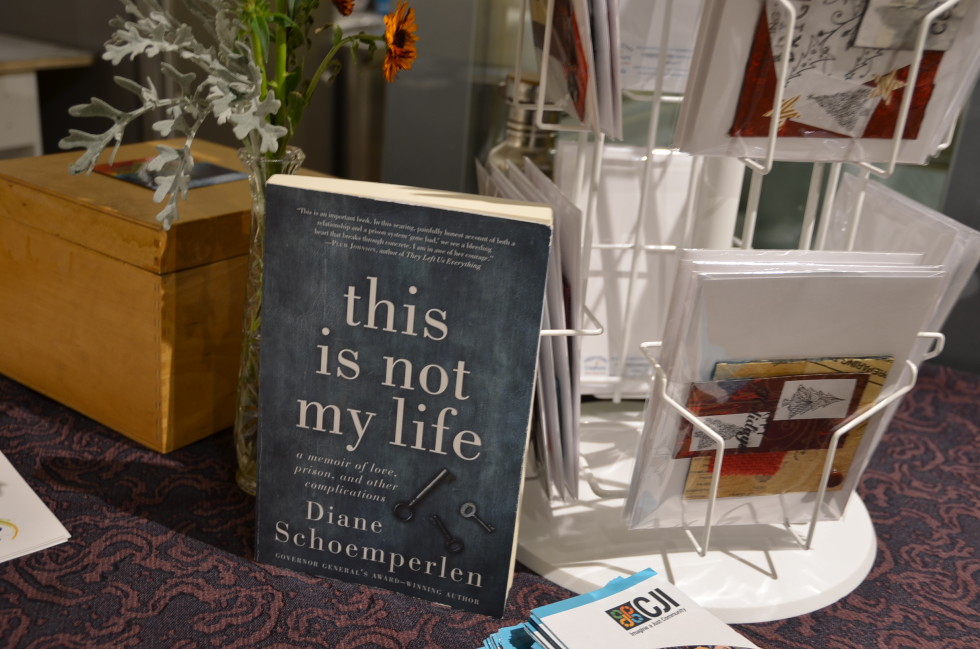
This is not my life by Diane Schoemperlen – our first book club selection for the Turn the Page Book Club focused on prisons, justice and love. A very entangled combination!
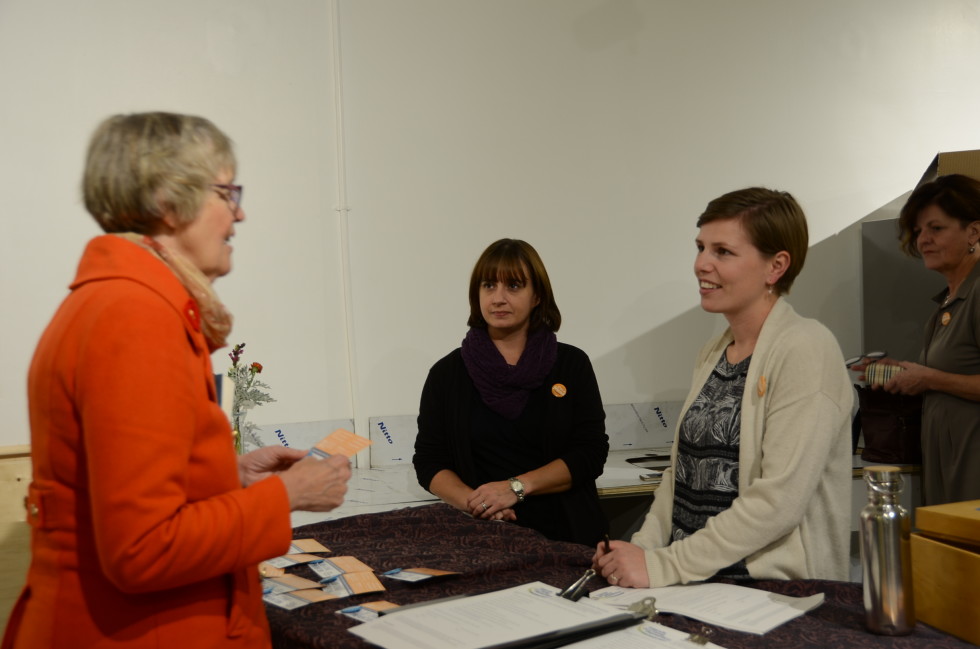
Friends of Crime Prevention, Jenn Robinson (middle) and Lisa Armstrong (right) were the most friendly greeters! Great to see so many new faces.
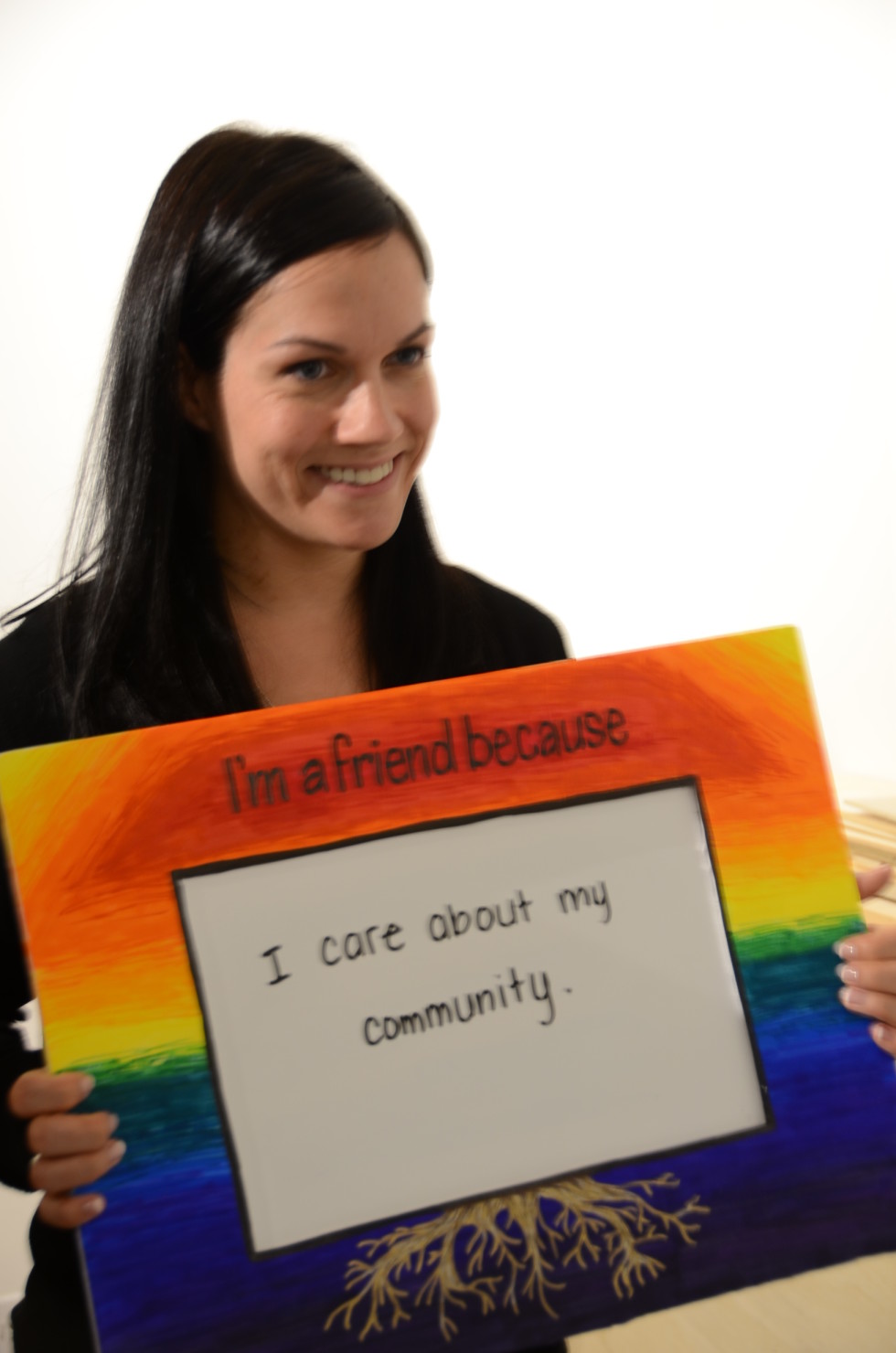
As people gathered for the evening, Friends of Crime Prevention had the opportunity to let us know why they are a Friend. Jeanean Thomas – because I care about my community
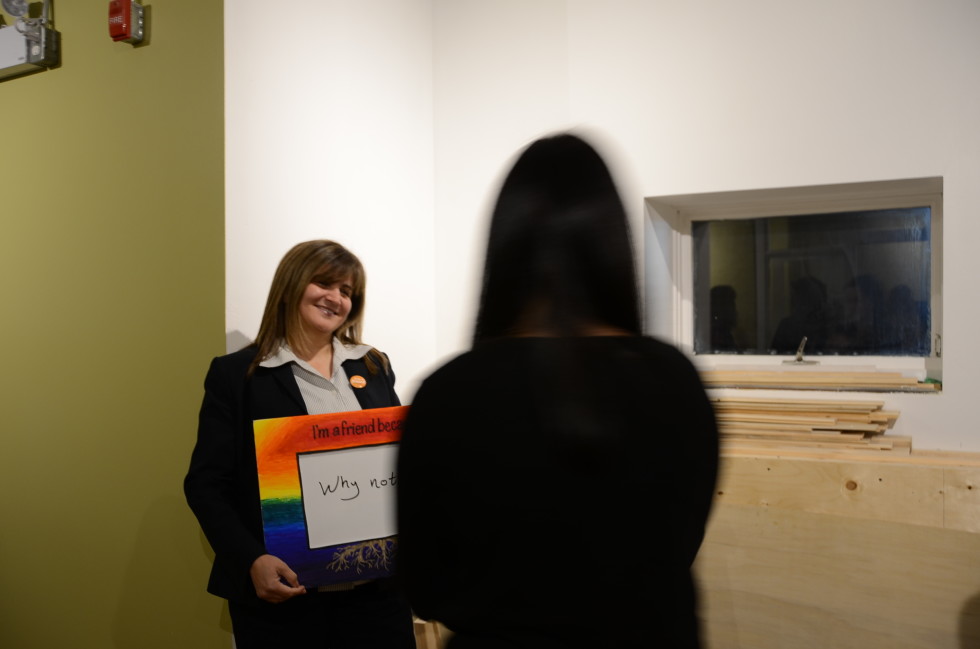
As people gathered for the evening, Friends of Crime Prevention had the opportunity to let us know why they are a Friend.
Pari Karem – Why not?!
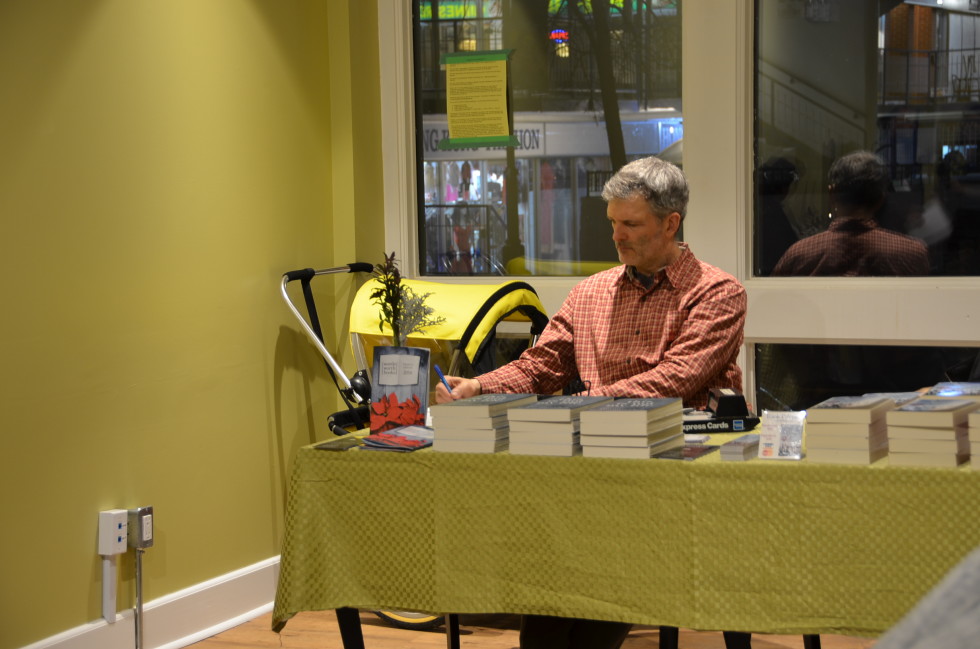
Thanks to John and Wordsworth Books for bringing extra copies of Diane’s book for sale!
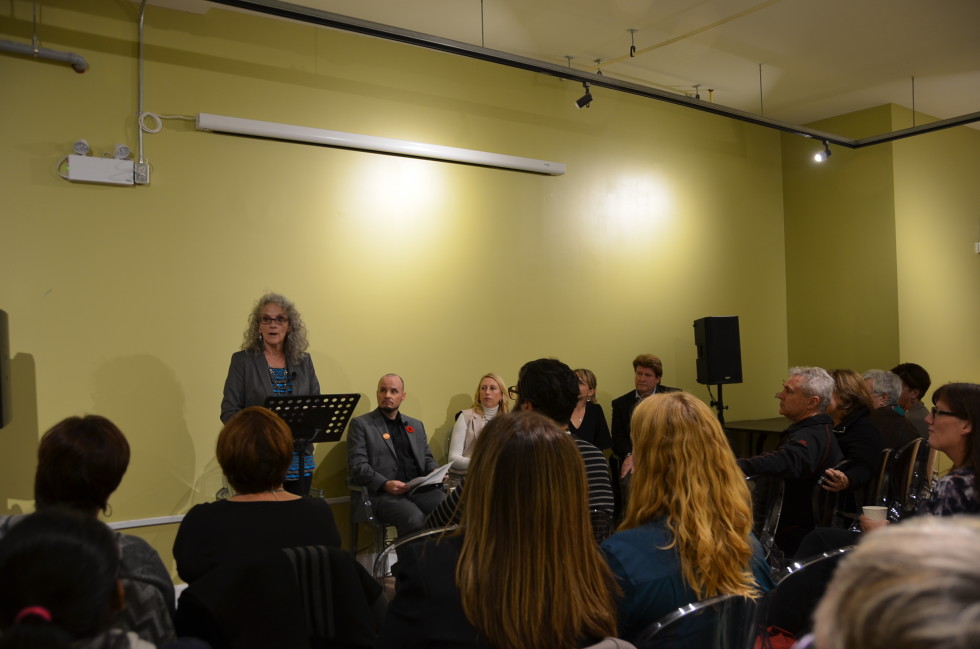
The inaugural Turn the Page Book Club was held at Fresh Ground, a new cafe & community space developed by The Working Centre.
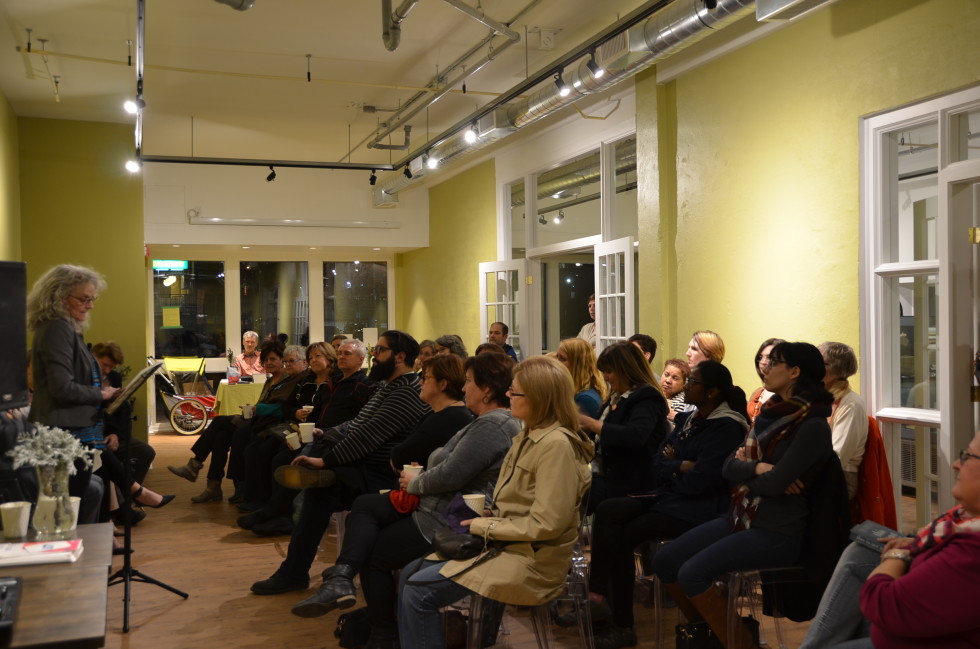
48 people gather to hear Diane read from her new book “This is Not My Life: A Memoir of Love, Prison, and other Complications.
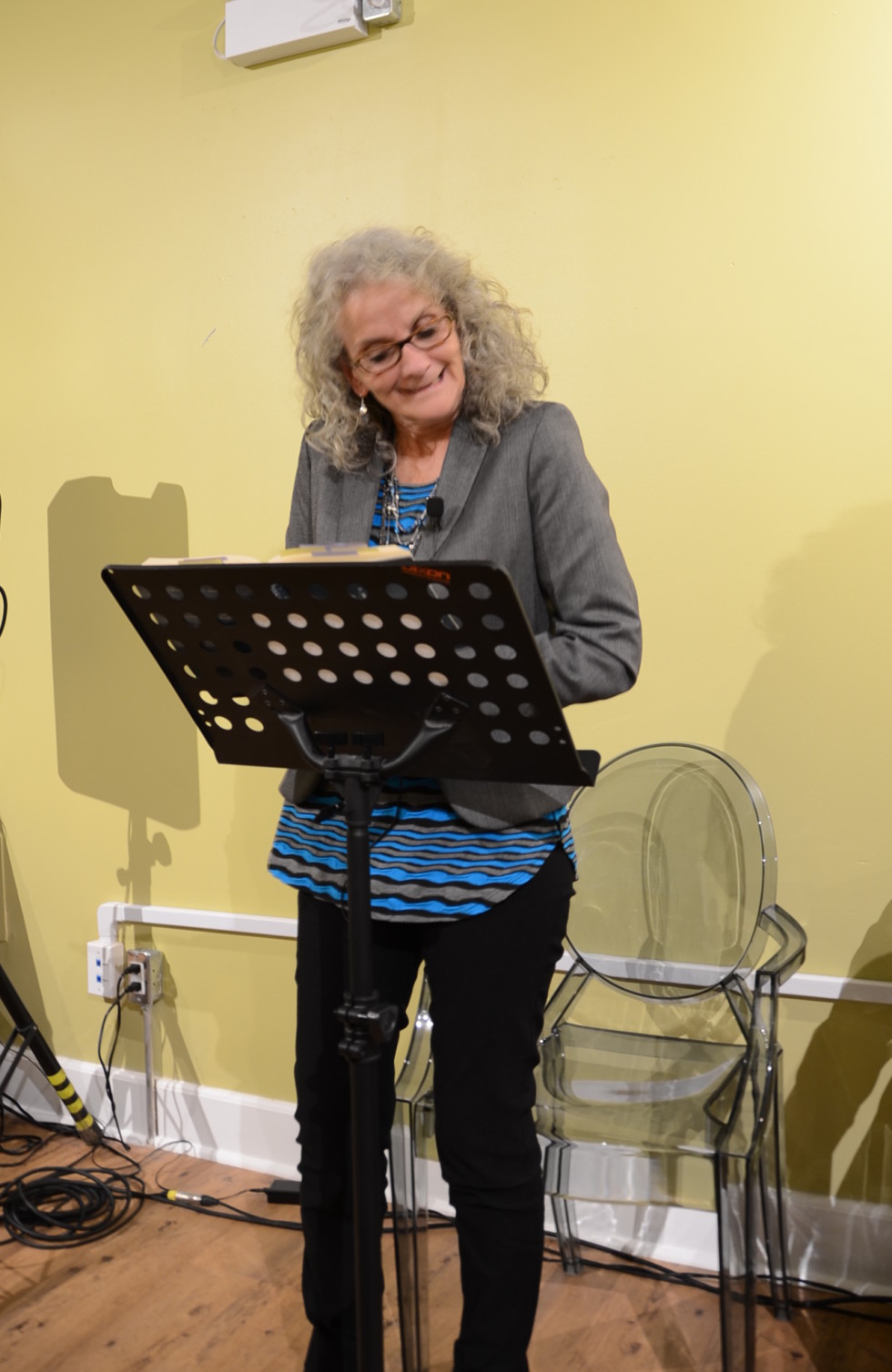
Diane reads the first line of the her book, a first line she is quite proud of! You’ll have to read the book to find out why this line still makes her laugh! Or listen to her interview with The Current on CBC Radio where the host reads it out loud.
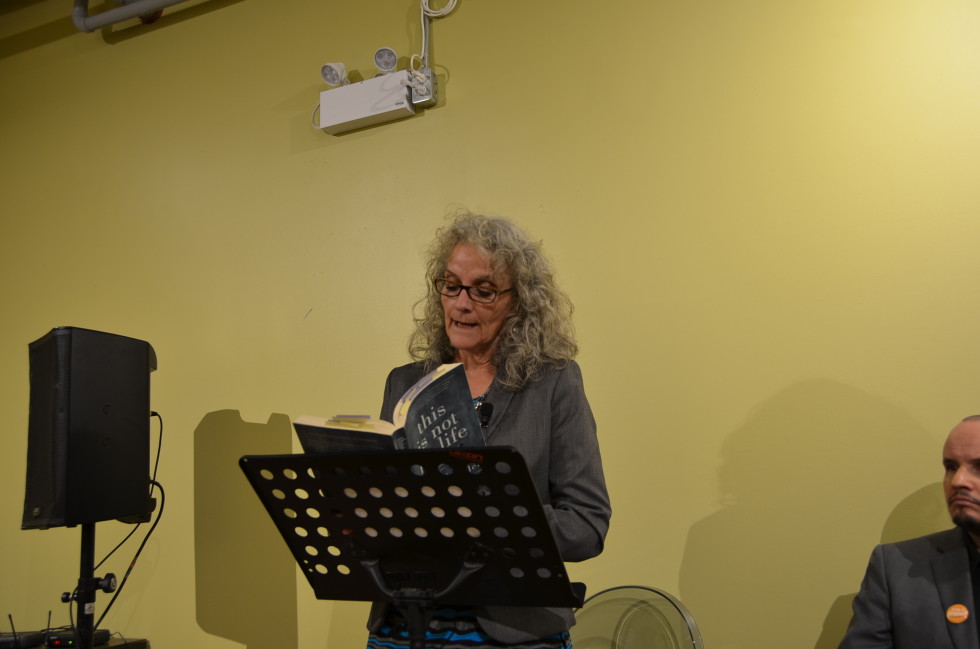
Diane reading some of the more emotionally challenging parts from her book.
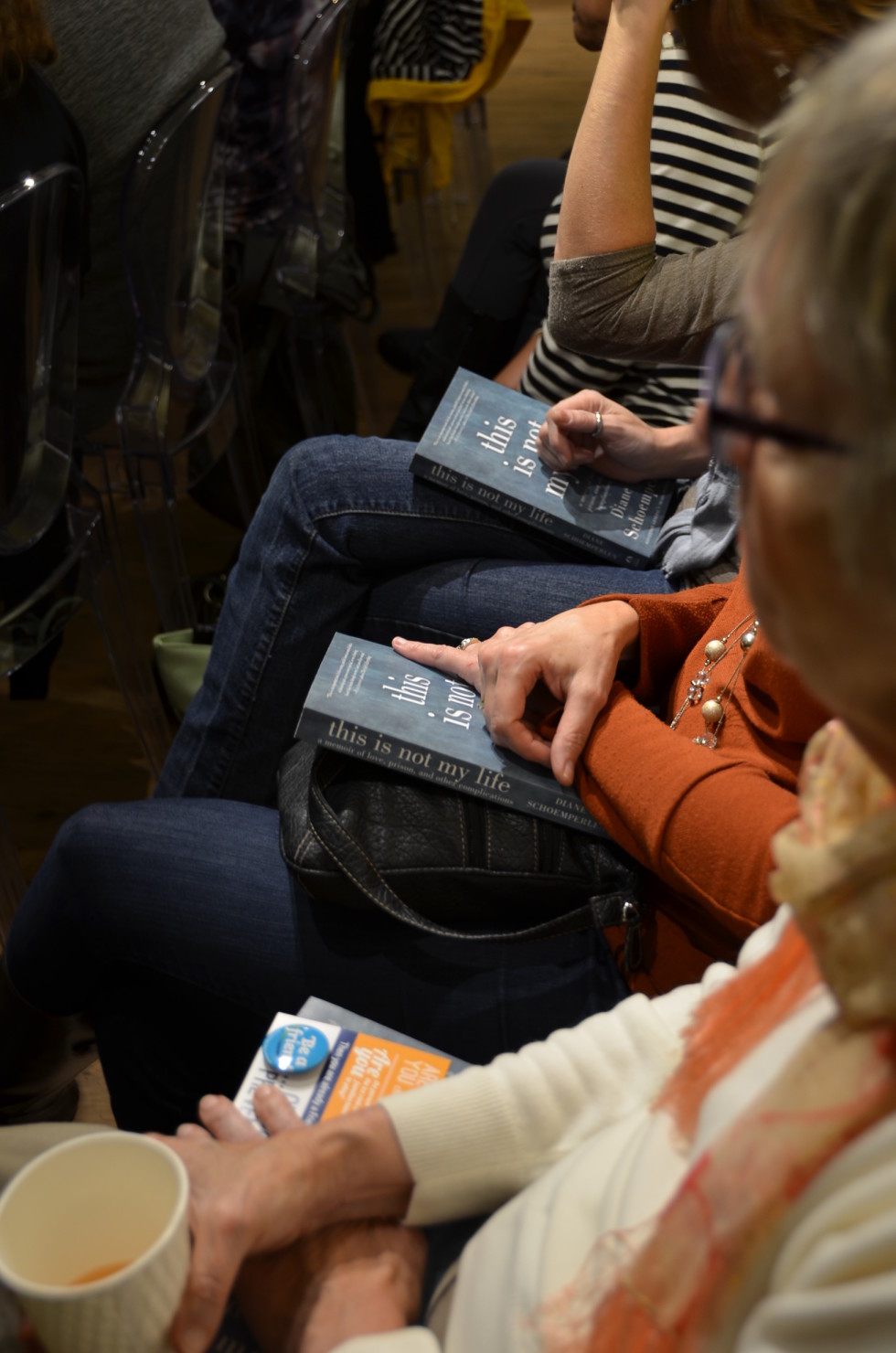
People came prepared! Many had read the book and had very insightful questions. Others came because of the topic, but bought the book by the end of the night!
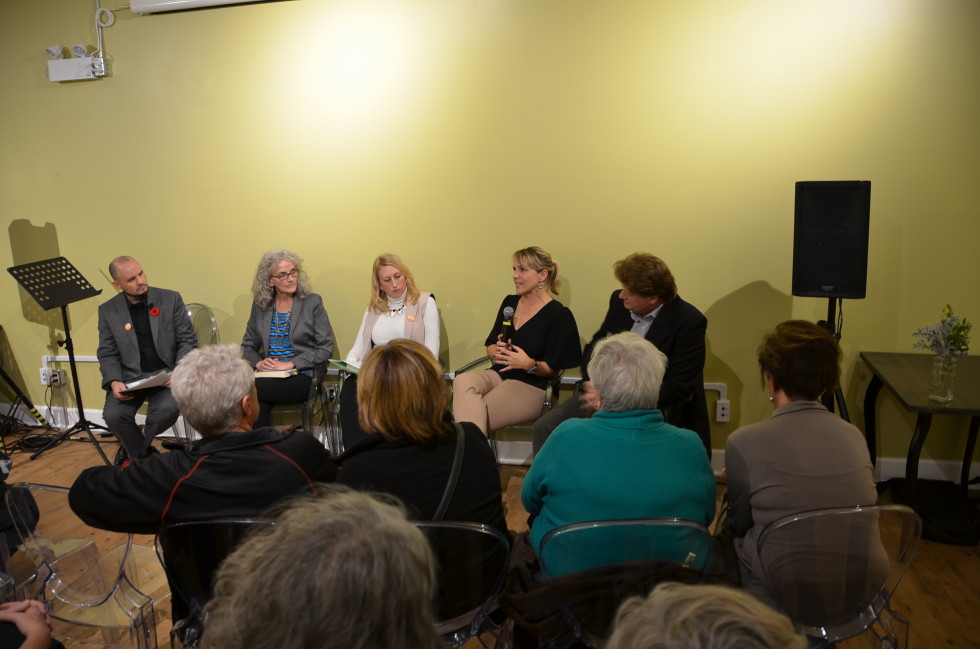
In addition to a talk and reading by Diane, we invited additional panel members from the community & beyond to complement the discussion of prisons, justice, stigma and relationships. From left: Mike Farwell, Moderator; Diane Schoemperlen, Author; Jen Hutton, Women’s Crisis Services Waterloo Region, Shannon Moroney, Author of Through the Glass; Chris Cowie, ED Community Justice Initiatives
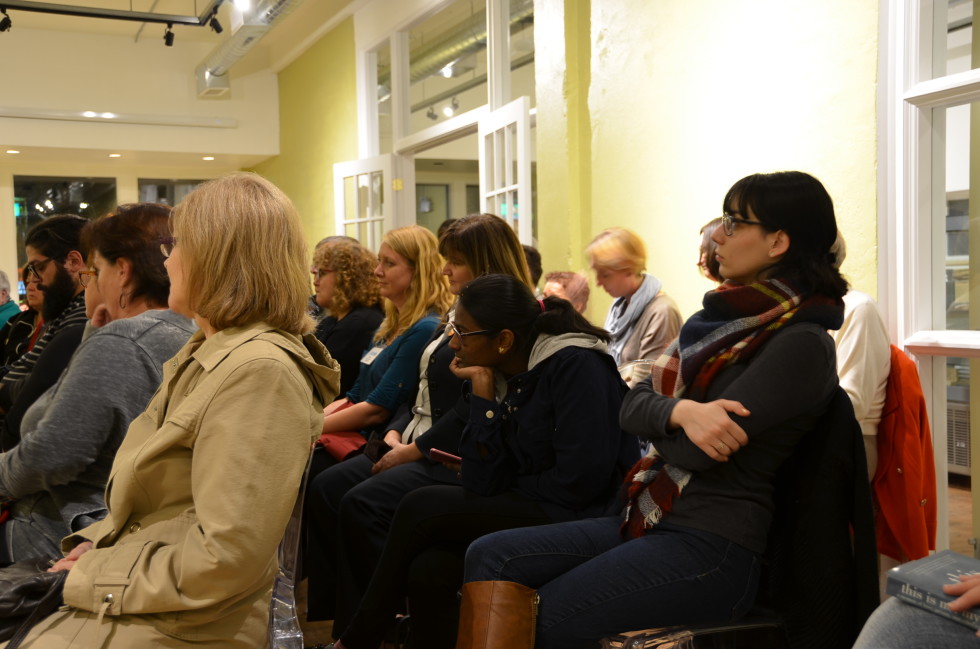
A very intent and listening audience!
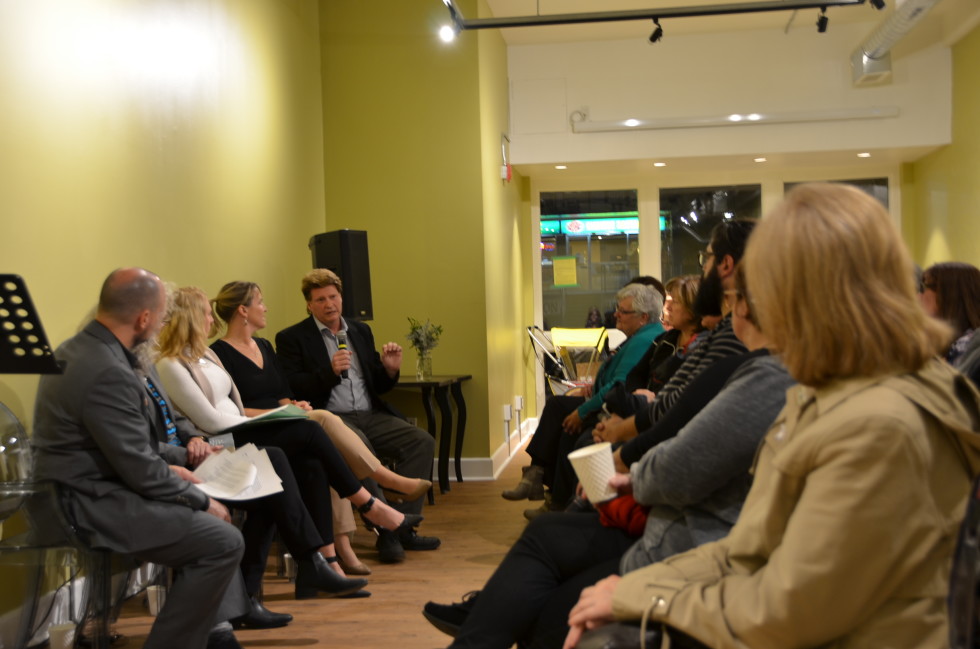
Chris Cowie from Community Justice Initiatives shared about the agency’s Restorative Justice mandate and how a more restorative process in prisons could help in countless ways i.e. better integration into society upon release, deeper understanding of the nature of offending, development of new skills to deal with conflict. Teaching and using restorative justice early can also be a prevention tool.
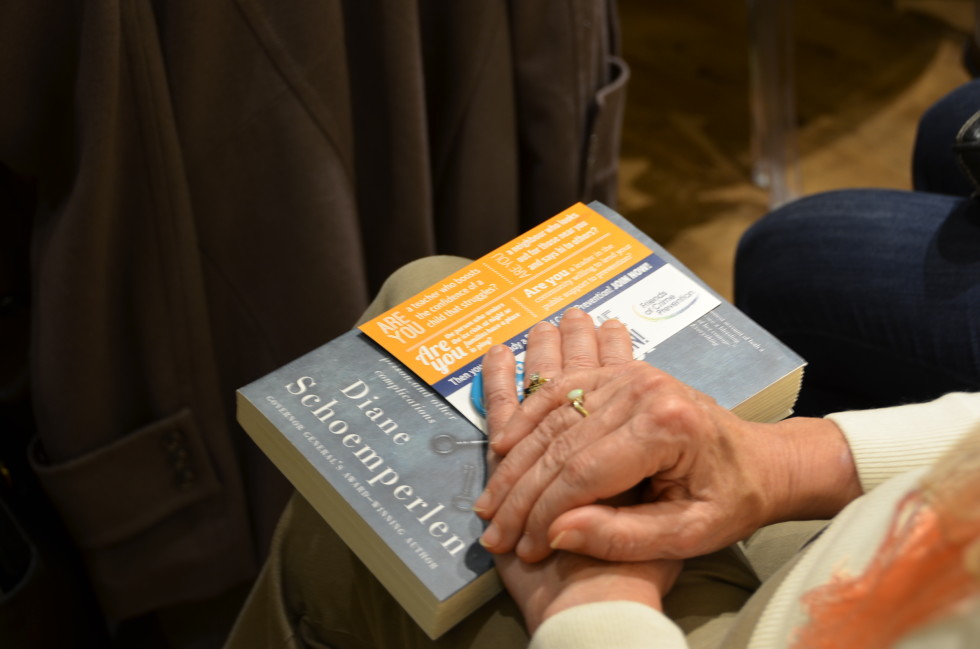
With all the new faces in the audience, it was a great opportunity for many to learn about w hat it means to be a Friend of Crime Prevention!

It only take a few minutes to become a Friend of Crime Prevention – just like Jen Hutton!
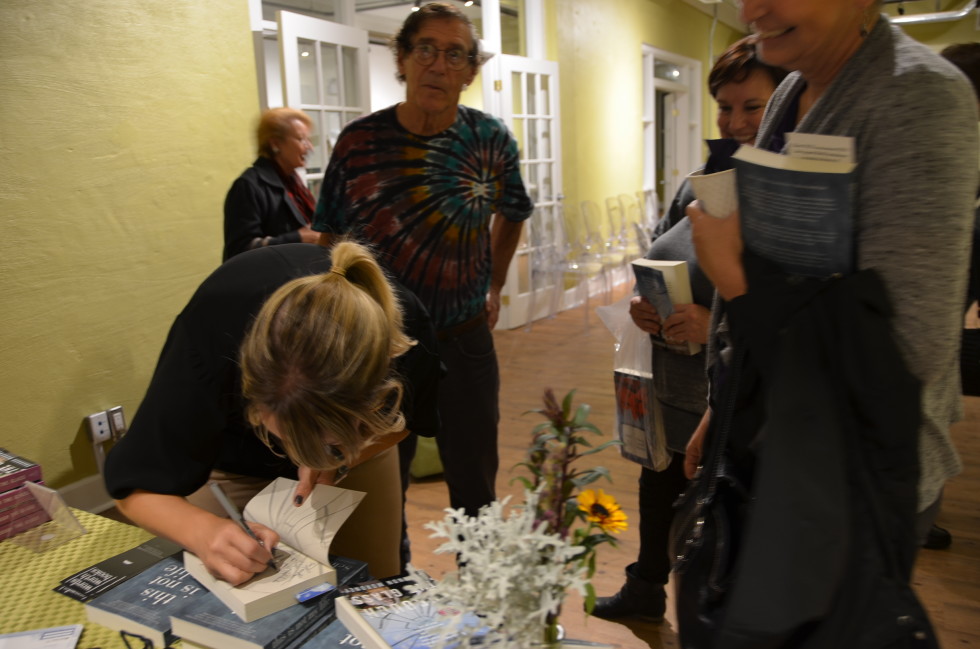
Both Diane and Shannon took time to sign books for anyone who wanted. Also a chance for great conversations.
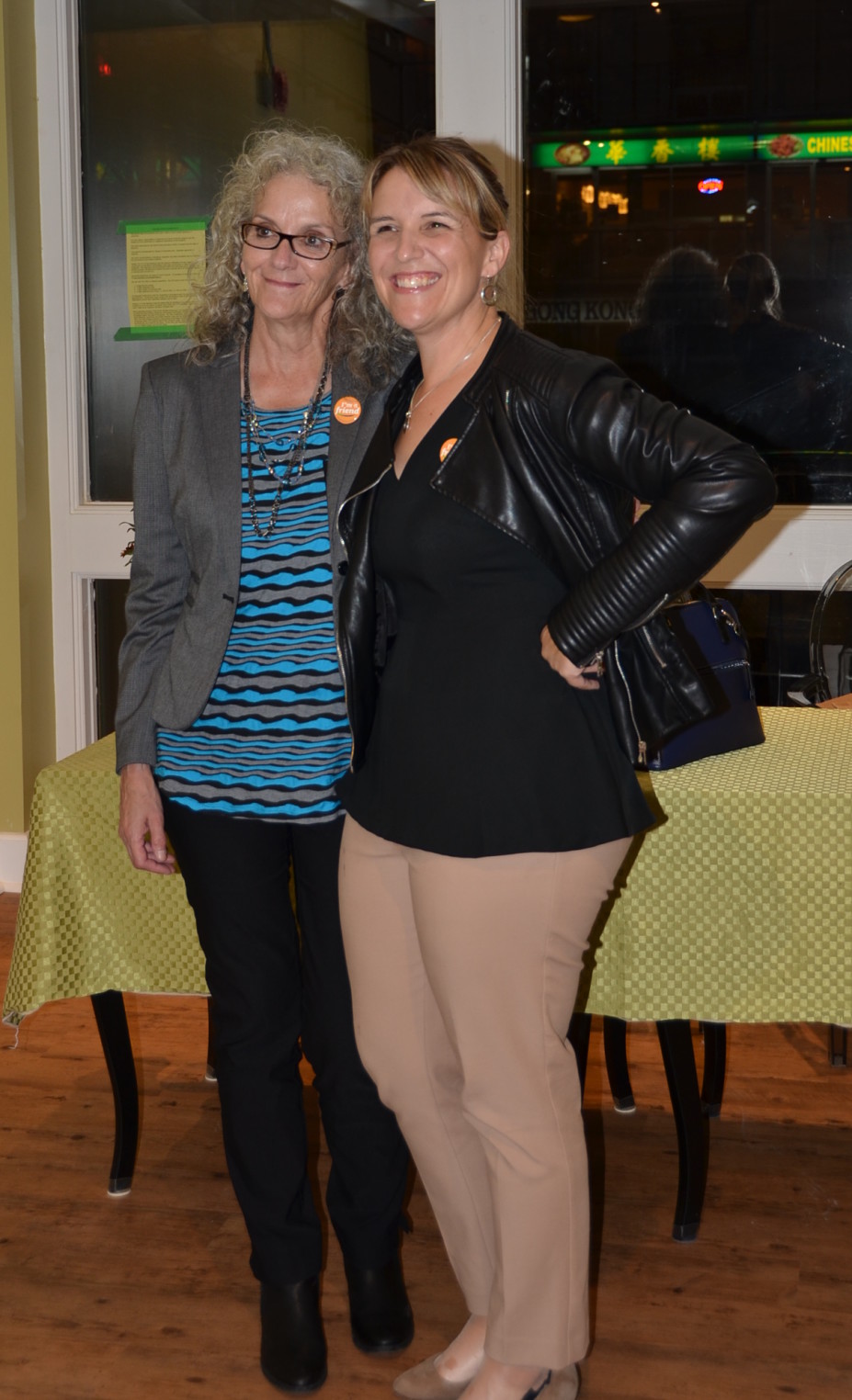
Diane and Shannon proudly display their “I am a Friend” buttons. Diane and Shannon were made honorary Friends and join Howard Sapers and Sir Neville, a guide dog, as Honorary Friends of Crime Prevention.
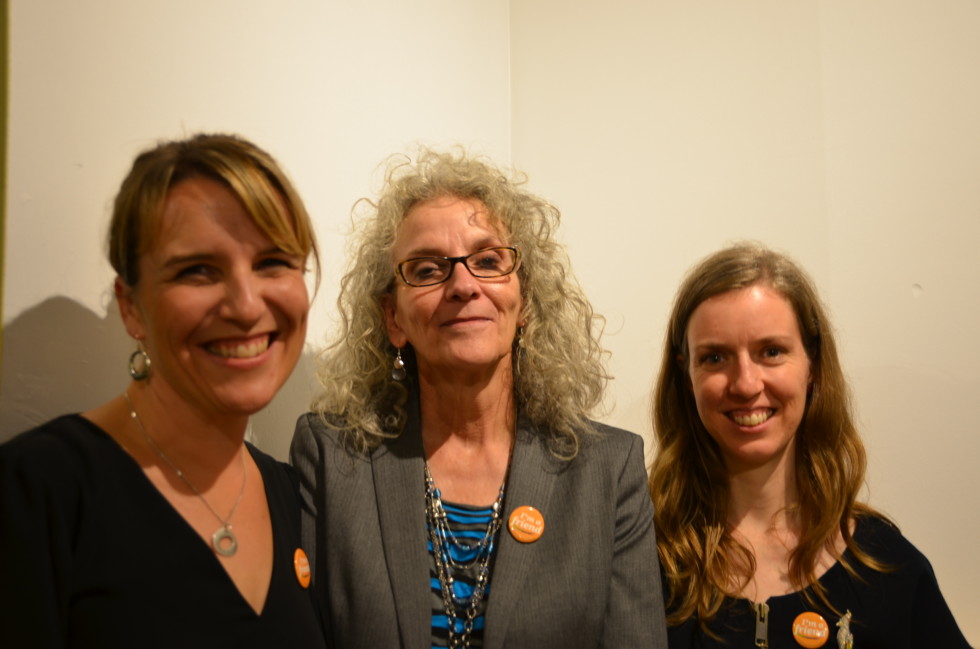
It was very special to have Shannon and Dianne together in the same evening. Shannon acted as a mentor to Diane during the writing of This is Not My Life. Shannon wrote her book Through the Glass about the life upheaval after husband confessed to the sexual assault and kidnapping of two women. Both Diane and Shannon have rich stories from which our community can learn so much! Diane and Shannon are pictured with Sarah Anderson, event organizer and facilitator from the Crime Prevention Council.
Posted on: September 16th, 2015 by Waterloo Region Crime Prevention Council
One of the most anticipated highlights of our year happened last week. In case you happened to miss it (?!) – although, I’m not sure how you could – Howard Sapers was in town. Yes, THE Howard Sapers. Federal Correctional Investigator for Canada and ombudsman for federally sentenced offenders.
We partnered with Kitchener Public Library as part of their new 85 Queen Speaker Series to host this event and filled the auditorium with 230 people from our community. The action packed evening included a screening of the film “State of Incarceration”, a keynote address by Howard Sapers and a panel discussion with community members, including a formerly incarcerated woman from Grand Valley Institution for Women.
-
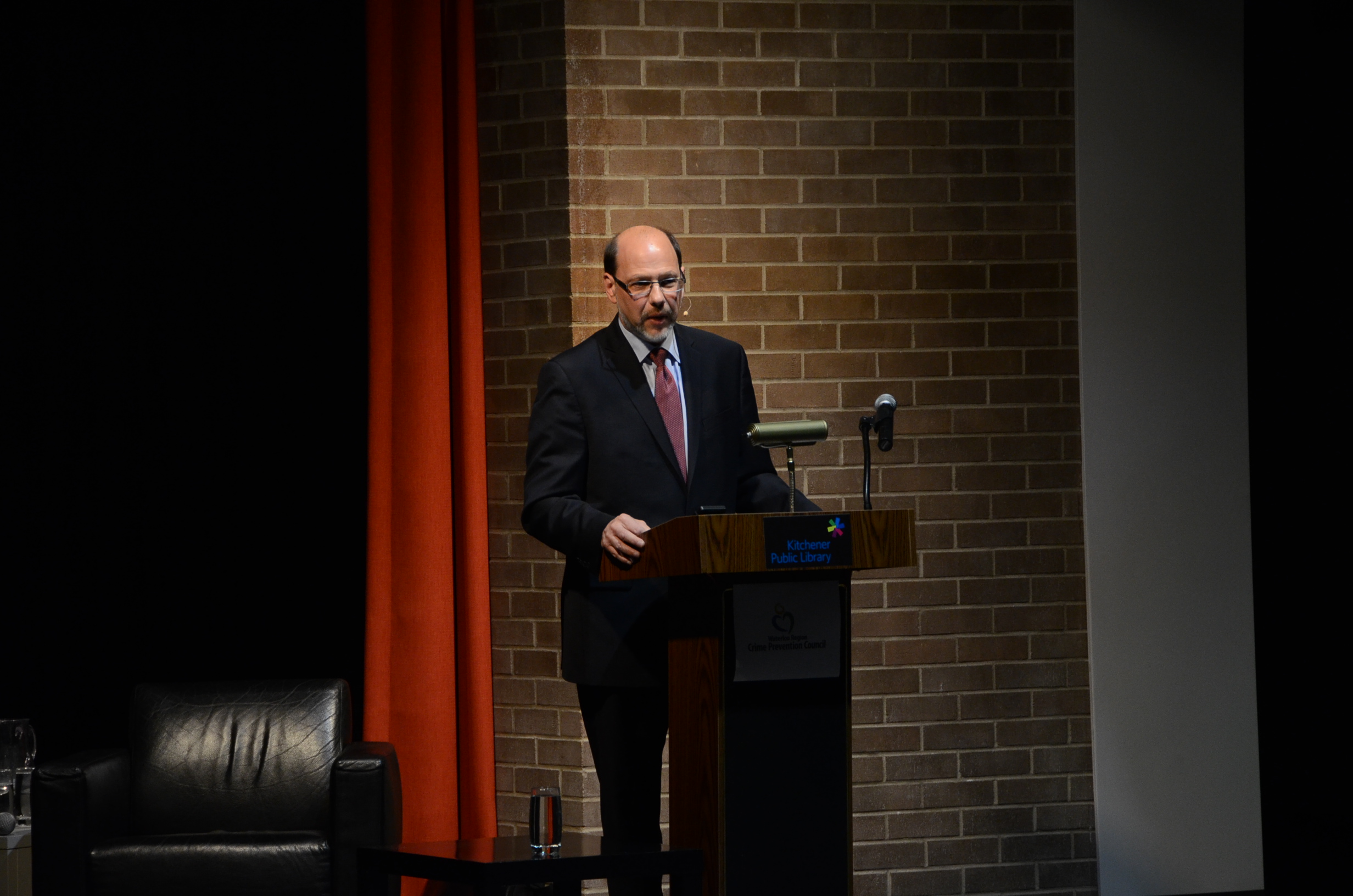
-
Howard Sapers oversees the Office of the Correctional Investigator, serving as an ombudsman for federally sentenced offenders.
-
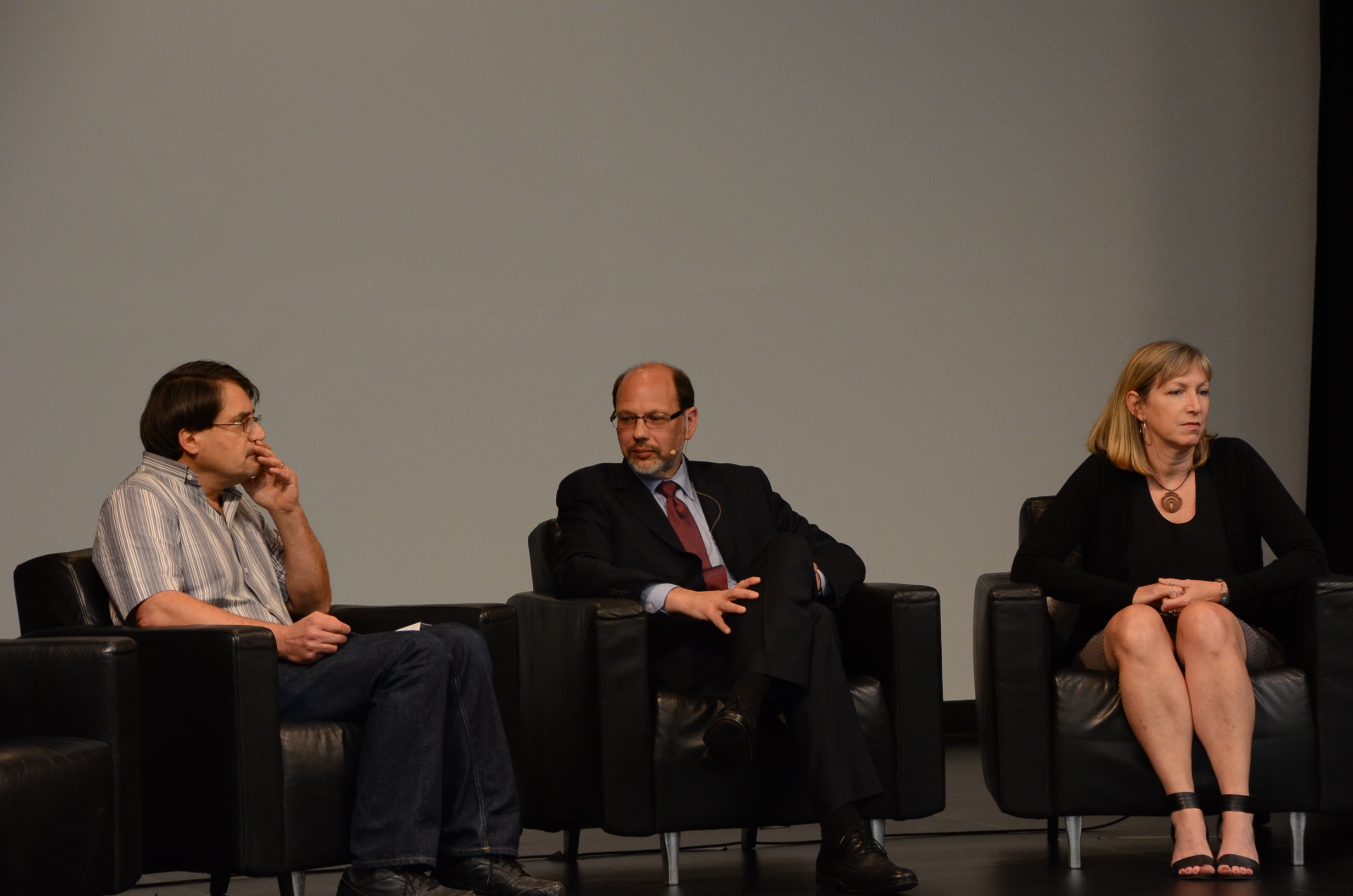
-
Panel with (from left) Chris Cowie from Community Justice Initiatives, (off camera) Joe Mancini from the Working Centre, Howard Sapers, Julie Thompson from CJI, and Dionne, (not seen, pseudonym), a former federal inmate.
-
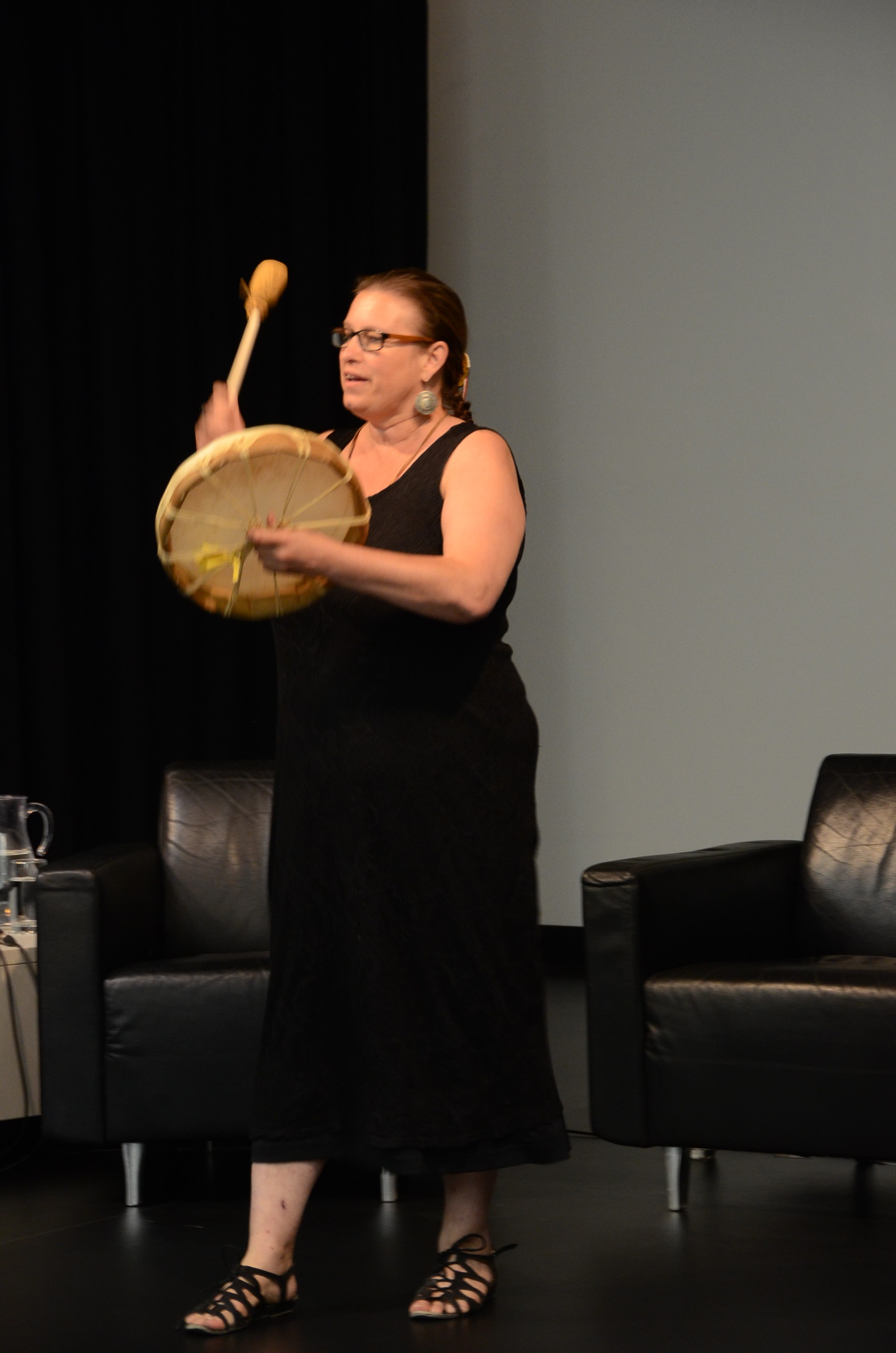
-
Aboriginal drummer Heather Majuary closed the event with drumming in honour of incarcerated Aboriginal lands.
-
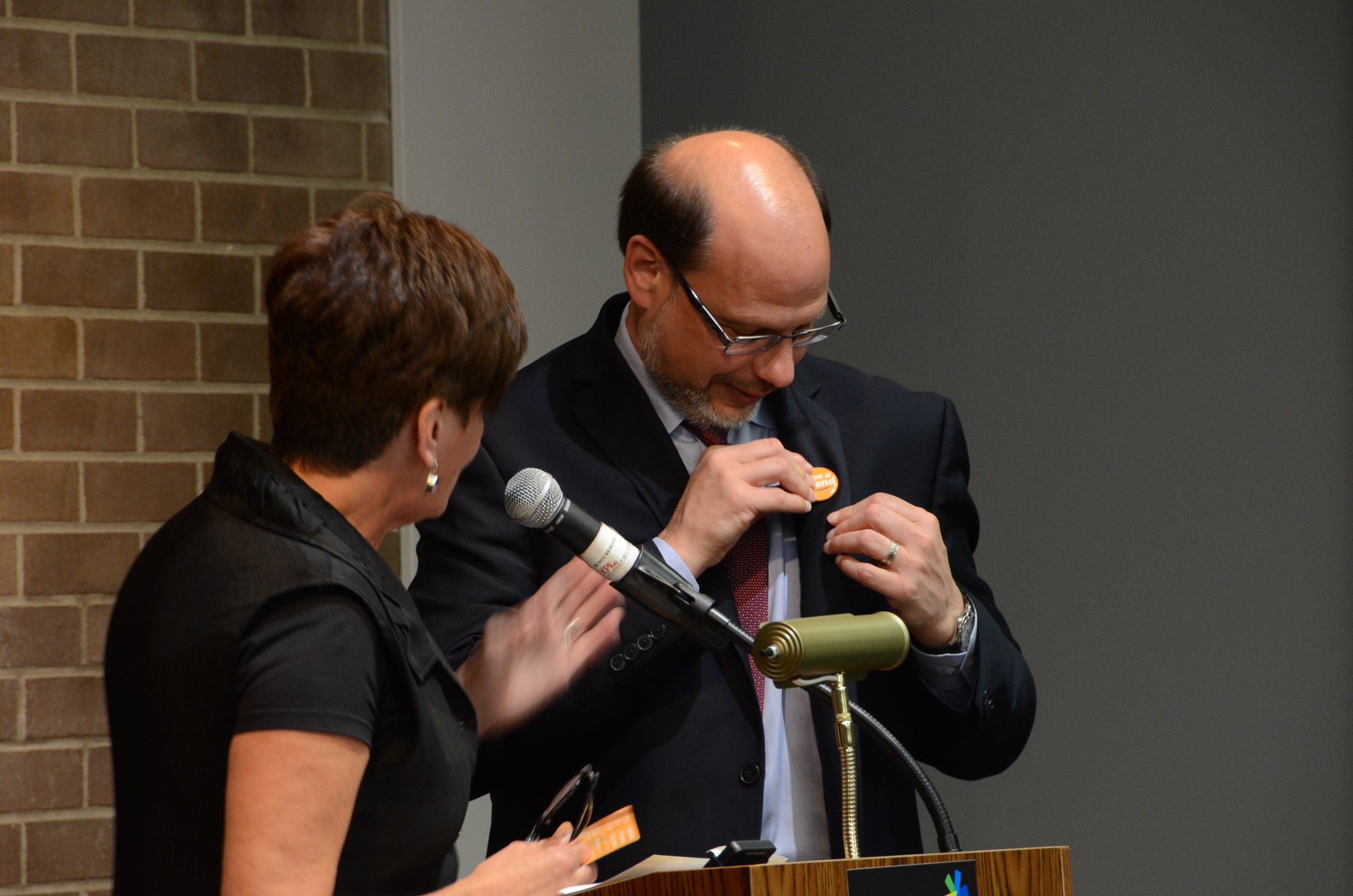
-
Howard Sapers becomes our first honourary Friend of Crime Prevention!
-
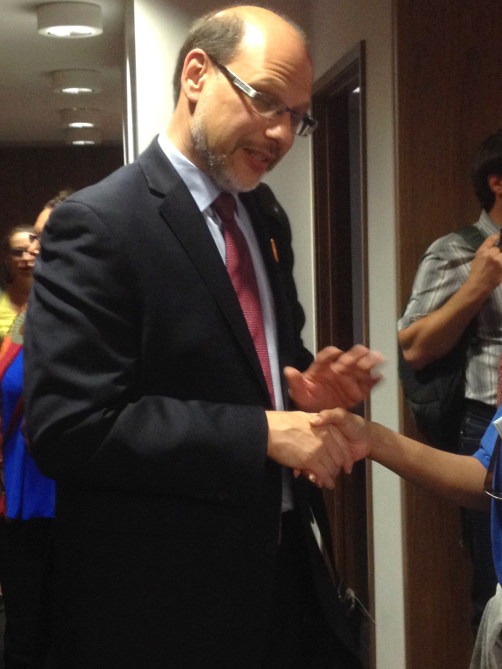
-
Howard Sapers chats with an attendee who is currently a minimum security inmate. [Source: Kitchener Public Library]
-

-
Regional Chair Ken Seiling with former parole officer Mark Yantzi, a pioneer in the field of restorative justice and past Executive Director of Community Justice Initiatives [Source: Kitchener Public Library]
-
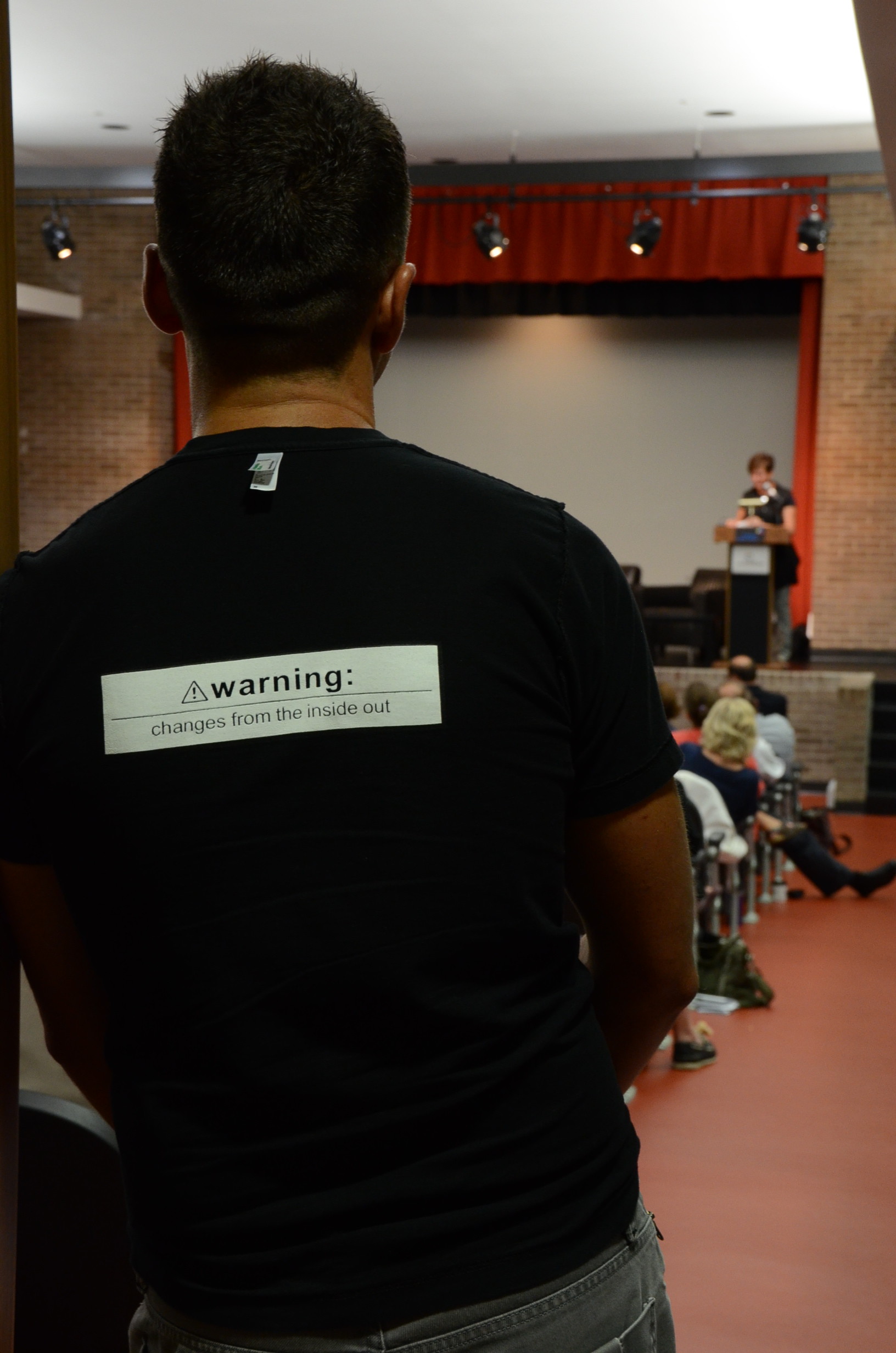
-
It’s true, change really does start from the inside. And that’s what Friends of Crime Prevention events are all about!
-
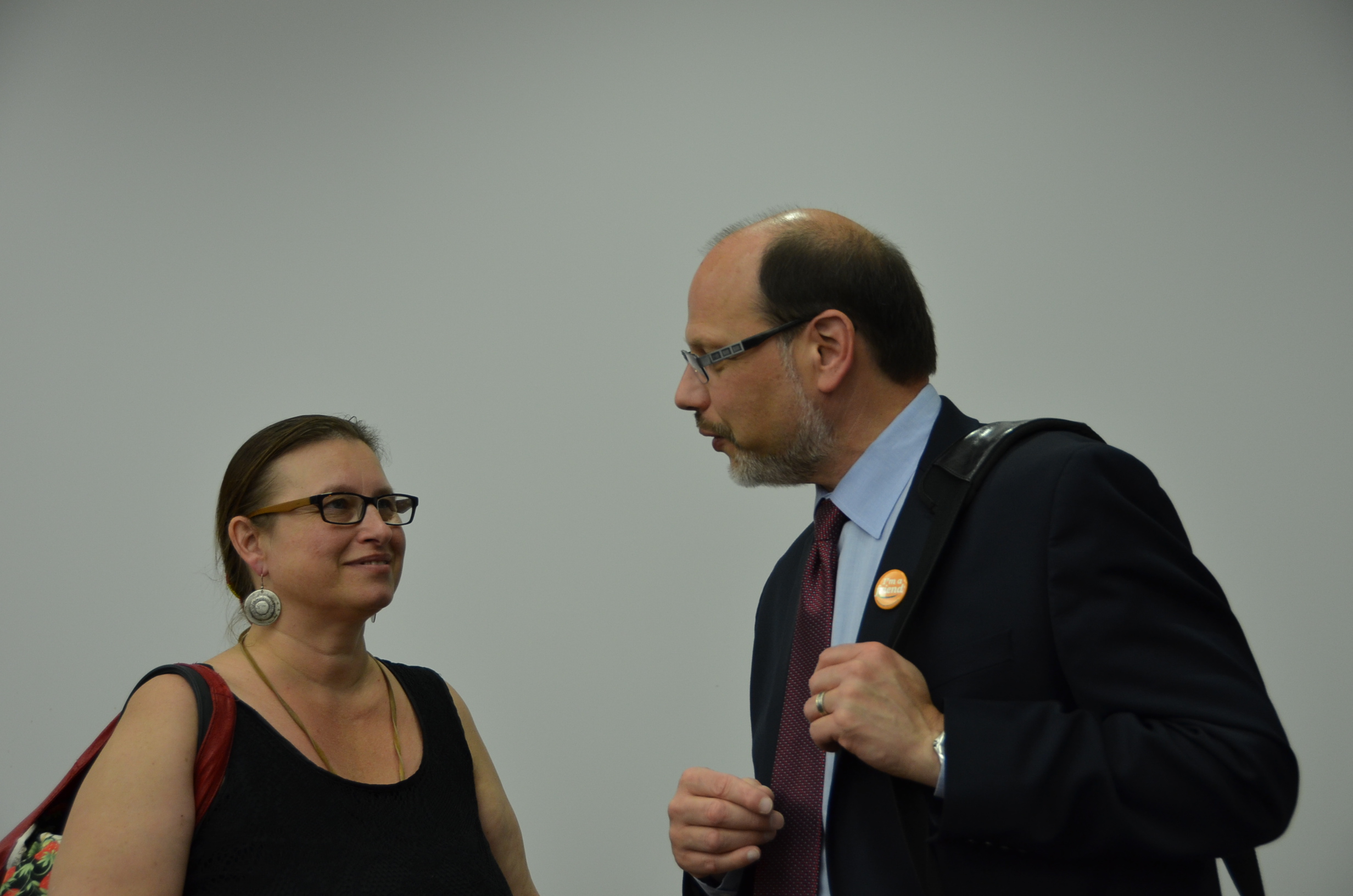
-
Howard Sapers chats with Aboriginal drummer Heather Majuary, who closed the event with drumming in honour of incarcerated Aboriginal lands
We have a video coming soon of Mr. Sapers’ keynote talk, but in the meantime, you can read his presentation here to catch all the incredible stats and stories he shared that night. He really does effectively paint a vivid picture about the state of Canadian prisons in 2015.
While you wait impatiently for the video, I”ll leave you with these two reflections from two currently incarcerated women from Grand Valley Institution for Women who attend the event. You’ll understand why it was such a big night.
Julie writes:
“I attended the forum for Friends of Crime Prevention, on September 10, 2015. I cannot begin to tell you how refreshing it is that discussions such as this are taking place. I was both shocked and pleasantly surprised at the amount of progressive people who attended the forum. There are faces and lives associated with the disturbing statistics Mr. Saper spoke of – mine is one of them. I was one of two currently incarcerated women at the event, with the Walls to Bridges Collective. Too often incarcerated people are treated as the rejects of society, disposable even, and let’s face it – advocating for us is not at the top of almost all priority lists. I firmly believe that many incarcerated people would not be in the criminal justice system to begin with, if they had been afforded access to and utilized stronger and earlier preventative measures through social intervention and more accessible social and health services; myself included. Sadly, I did not consider the flaws in our systems until I was directly affected. Now that I am, however, I cannot turn a blind eye to them anymore, not just for myself, but for the staggering amount of other people making up those statistics, and for those yet to come. I am relieved to know I am not alone in this quest. All human life has value – thank you for making “out of sight” not be “out of mind” anymore. The forum helped to humanize us and highlight some of the injustices of our daily reality. I left with a renewed sense of hope and purpose. I am thankful that this forum created a safe place for people to come together, ask questions, and push boundaries. To evoke much needed change will require more bridges to be built than walls. We have a long way to go, but I am hopeful that just as a storm starts with a single raindrop, so too does change start with forums such as this one.”
Denise writes:
Just as the world will always remember September 11, 2001, in a negative light, Thursday, September 10, 2015 will be etched in my mind for as long as I exist as an achievement to social awareness. You see, since my incarceration it was the only day in which I came in contact with people besides volunteers and members of the Walls to Bridges group and voice my dilemma while feeling safe to bare my soul. Mr. Howard Sapers provided statistics that were both daunting and hopeful. Information on how tax dollars are truly spent to build and house a growing prison population at a time where the crime rate for the past decade plus has been on the decline. I am part of those statistics and Canada is following the footsteps of the failed American system that ex President Bill Clinton and present sitting President Barak Obama stated ‘is not working’. The large majority of incarcerated people will be released and upon their discharge, are expected to function and contribute to the same society that deemed them as criminals. If education is at least a gateway to success, incarcerated people need more training to learn and utilize skills and tools required to help them successfully add to the fabric of society’s fast paced, ever changing existence. Prevention, Prisons & Popcorn at Kitchen Public Library was a forum that brought together a community of progressive thinking people aware of the challenges society will surely be faced with once the voiceless, faceless people are unconstrained. An awareness of prisons and the need for community inclusion upon the release of prisoners are part of an encompassing subject tax payers don’t realize every member of a community may be accountable for. After someone goes from inmate to civilian because they have paid their dues to a faulty justice system and they no longer live in the past where they made poor choices, when do they get a fair shot at being seen in a new light? There needs to be more discussions such as the one Prevention, Prisons & Popcorn opened up where communities are aware of their interconnectedness to their surroundings, even their walled surroundings.
Yep, it was that kind of night.
Posted on: April 7th, 2015 by Waterloo Region Crime Prevention Council
Back in February 2015, the Church Council on Justice and Corrections (CCJC), released a very promising evaluation report on the Circles of Support and Accountability (CoSA) program that operates across Canada. CoSA is a “community-based reintegration program, grounded in restorative justice principles, that holds sex offenders accountable for the harm they have caused while assisting with their task of re-entry into communities at the end of their sentences”.
The evaluation, the first of its kind in Canada, gives an in depth description of how the program works, documenting it’s success rate and cost savings due to reduced recidivism and reoffending. In short, the evaluation says that this program works.
Great news!
But then, on March 2nd 2015, it was announced that as of March 31, 2015, Correctional Services Canada (CSC) would not renew the funding it has been providing since 1996, as a partner to CoSA. The program has additional partners in numerous Canadian cities such as the Mennonite Central Committee Ontario (MCCO) for the program operated in Kitchener, Hamilton and Toronto. MCCO has funding from CSC until March 31, 2018.
CoSA Canada quickly released a statement to clarify and restate the real impacts of this program: a proven model that addresses a high risk crime against vulnerable people in a humane and accountable way and shows that it can reduce recidivism of the highest risk sexual offenders by 70 – 83%.
This is what we at the Crime Prevention Council would be inclined to call a “smart on crime” approach to reducing crime and victimization:
- the program is based in good evidence,
- the approach is measured and documented in similar ways across programs,
- it has produced excellent results,
- it is proven to reduce and prevent further crimes at a lower cost than keeping an individual incarcerated for “life”, and,
- helps to reintegrate individuals into our community, which is where 95% of people exiting prison, including those convicted of sexual offenses, will return eventually at the end of their sentences
Meanwhile, this ‘made in Canada’ approach has been successfully exported to a number of jurisdictions in the U.S. and the U.K., in addition to France, The Netherlands, Italy, Australia, New Zealand, Latvia and South Korea.
When programs show that they accomplish what they set out to do at comparatively low investment and provide a high return on investment to the safety of our community, their sustainability is not only vital, but smart and it makes so much more sense to support of them rather than cut them.
As such, the decision by CSC to cut funding for CoSA is tough to understand and needs further dialogue and consideration.
 All of the calls to action already mentioned in the previous blog posts (humanizing people in prison & advocating for programs that work) help to create and strengthen system change in big and small ways. The work of larger structural change is long term, often slow work: Not for the faint of heart, but everyone can still play a role.
All of the calls to action already mentioned in the previous blog posts (humanizing people in prison & advocating for programs that work) help to create and strengthen system change in big and small ways. The work of larger structural change is long term, often slow work: Not for the faint of heart, but everyone can still play a role.


























